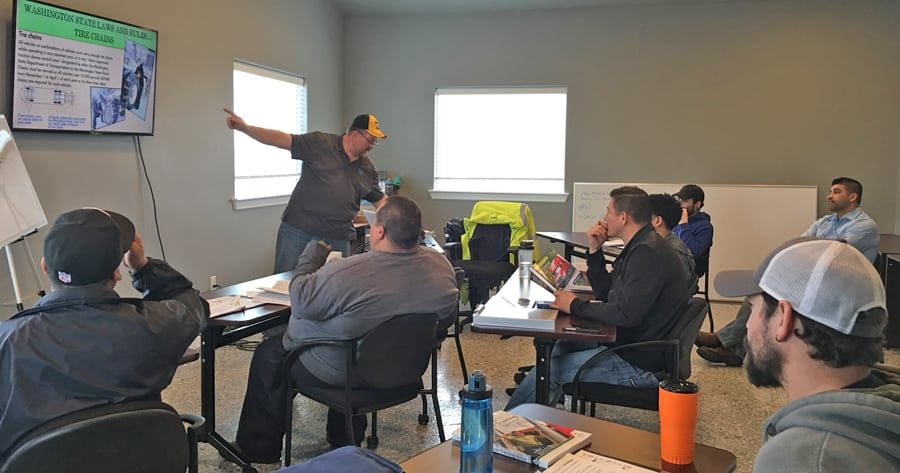
Home » Demand for drivers prompts Martinez Trucking to open its own school
Demand for drivers prompts Martinez Trucking to open its own school

April 13, 2017
The trucking industry has had a tough time finding qualified drivers over the last 10 to 15 years.
So Martinez Trucking decided to do something about it by creating its own truck drivers’ school.
[blockquote quote="Today’s truck driver has to be tech savvy." source="Z Martinez, operations manager for Martinez Trucking" align="right" max_width="300px"]
It’s called the Martinez Technical Institute and it’s located in a new building at 2020 Garland St. in Pasco on Martinez Trucking’s lot near King City.
“We started the school because we need drivers,” said Zenaido Martinez III, one of six family members working with the company. “Our trucks and our industry require a special set of skills. So we started the school. We need drivers. We’re always hiring all of the time.”
Today, Zenaido III – everyone calls him Z – is the operations manager.
Martinez Trucking has been a success story in the Mid-Columbia.
The company was started by Zenaido Martinez Jr. with one truck 34 years ago in Basin City.
Martinez and his wife, Dora, expanded to 15 trucks and moved the business to Pasco.
Their children eventually joined the business.
Brother Nathan Martinez is the service manager, while another brother, Stephen Martinez, is the logistics manager.
A sister, Stephanie Coria, is the human resource manager.
Over the last three years, Martinez Trucking has grown to include a fleet of 55 trucks.
“But we need to get to 60 to 65 in a hurry,” said Z Martinez.
Martinez Trucking averages 85 to 90 employees a year.
Z Martinez said the company’s main job is moving agricultural products, which accounts for about 80 percent of its workload.
That includes working with companies like Lamb Weston and Grimmway Farms.
“Grimmway Farms out of Bakersfield (California) they moved up here because there were a lot of opportunities up here,” said Z Martinez. “Their processing and packaging facilities are up here now. When we started working with them, we went from 200 loads a year to 6,000 loads last year.”
The remaining 20 percent of Martinez Trucking’s business is hauling finished goods and miscellaneous equipment.
It’s a good business, Z Martinez said.
“The average (annual) salary for a truck driver is $65,000,” he said. “But I have guys who have made over $100,000. Our top guys usually are over $85,000.”
But there have been challenges, too.
“We’ve had substantial growth the last three years,” said Z Martinez. “We bought some equipment that’s needed some work. And we’ve had some driver error.
“We had a high turnover rate,” he said. “The reason why, is we didn’t offer medical insurance. Now we do, and we don’t have very much turnover. If someone leaves, it’s usually because we want them to. We also had high maintenance costs. We were finding people were rough on the equipment.”
And finding more qualified drivers has been a challenge, both locally and nationwide.
Bob Costello, chief economist and senior vice president at the national American Trucking Associations, or ATA, worked with Rod Suarez, an economic analyst for the ATA, on a truck driver shortage analysis in October 2015.
They found the average age of a truck driver in this country is 49 and 5.8 percent of all drivers are women.
That’s what Z Martinez sees too.
“Older drivers are retiring,” he said. “And the younger generation always thought that trucking just simply wasn’t that glamorous.”
The report by Costello and Suarez also stated that in “2014, the trucking industry was short 38,000 drivers. It was expected in 2015 for the shortage to jump up to 47,500. If the trend continues, that shortage could be 175,000 by 2024.”
Furthermore, the report states that “quality versus quantity makes it worse. Carriers are finding few eligible candidates for jobs. In 2012, 88 percent of fleets said that most applicants were simply not qualified.”
That’s what the Martinez family saw too.
“Today’s truck driver has to be tech savvy,” said Z Martinez. “They need to know how to use a GPS and how to work an electronic log.”
This is where the idea of a school came in—so Martinez Trucking could train drivers the way management wanted.
“The idea actually started in January of 2016,” said Z Martinez. “It started out as ‘Let’s train our own guys.’ (Instructor) Wayne Ellis and Michael Harper, an employee, put together the curriculum. Within five months we had the curriculum established, tied in with (Washington State Department of Transportation) rules.
“But one big advantage of having a school is we’re tied into a trucking business: ours,” he said. “A driver can get a CDL (commercial driver’s license) in four weeks.”
Tuition is $4,350.
MTI is the fourth truck driving school in the Tri-Cities. There’s another one in Grandview and another in Walla Walla. Columbia Basin College also recently invested in a $111,000 truck simulator for its revived Commerical Driver’s License certification program.
“I do see the other schools as competition, but only because they may have a prospect at their school that we may want to have here,” said Z Martinez, who cautions students at the beginning of MTI classes that they’re not guaranteed a job with Martinez Trucking. “Our main goal is to put you into our truck. The worst-case scenario is you’ll walk out of here a professional driver.”
MTI has a job placement assistance program that’s partnered with Washington WorkSource, but it’s not an accredited school yet.
“We plan to get it accredited. It’s a two-year process to meet the standards,” said Z Martinez.
Currently, the school has eight students.
Ellis and Martin Ochoa are the instructors, but Z Martinez said he’s already looking to add a third instructor.
Students spend the first week attending classroom sessions.
The next three weeks involve driving and more class sessions.
“We have two 18-wheelers,” said Z Martinez. “The challenge for us is some of the students we were getting in the past were trained on a seven-speed. If you miss a gear with a truck carrying 100,000 pounds of product, you’ve got a problem. These trucks we have are 10-speed freighters, and they’re user-friendly.”
Drivers who pass the course will meet the state requirements for the DOT.
But if they’re hired to work for Martinez Trucking, they will have what Z Martinez calls “graduate school.”
“They’ll need to learn how to drive our trucks,” he said. “We have 10-speeds, 13-speeds, Super 10s and 18-speeds. But most of the trucks we have are 10-speeds and 13-speeds.”
Z Martinez, who also said the company will have current drivers do continuous training, plans to have a ribbon cutting ceremony for the school in the near future.
He said he’s also finding there’s another need in the industry: “Different companies have called us, asking for help in certification for technology,” he said. “Everyone needs more mechanics. So we may get more involved with that technology.”
The need for people to work in the trucking industry is critical.
Costello says now, more than ever, the economy needs more truck drivers.
“Truck driving is vital to our economy,” Costello said in an email to the Tri-Cities Area Journal of Business. “Without truck drivers, the economy would come to a grinding halt. Trucks move over 70 percent over all the freight tonnage in the United States. It is by far the largest mode of freight transportation.
“Of course for now and the foreseeable future, we need a driver in the seat to move that freight. So without truck drivers, the economy doesn’t move.”
Z Martinez and his family agree with that, too.
“It’s the No. 1 way we move things,” said Z Martinez. “Trains are great, and we work hand in hand with them. But anything you can put on a trailer, we can move. The need has never been higher than it is right now.
“We’ve gotta move stuff.”
For more information, call Martinez Technical Institute at 509-416-2509, visit mti.live or find the company on Facebook.
Local News Transportation
KEYWORDS april 2017




